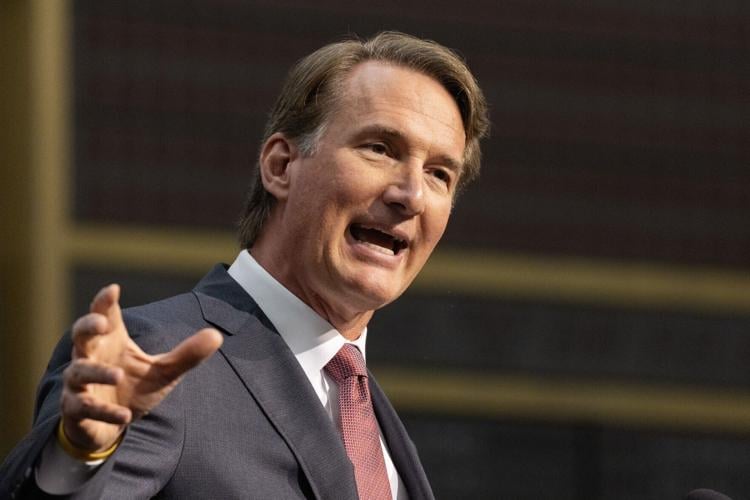RICHMOND — Virginia remains more than $200 million ahead of its forecast for tax revenues to meet its budget obligations with two months left in the fiscal year, but state policymakers remain concerned over the potential economic fallout from shifting federal government policies on spending and tariffs.
State tax collections through April were $1.5 billion ahead of the same 10-month period a year ago, but the margin shrank to $211.1 million when compared to the revenue projections that used to assemble a revised two-year budget that he introduced in December and signed earlier this month.

Gov. Glenn Youngkin, shown May 2 announcing his final action on the state budget, said Friday that "Virginia's financial results remain strong, thanks to robust business investment and a strong job market."
Youngkin vetoed 37 line-items in the budget this month, primarily to reduce spending by about $900 million as a cushion against a potential 3% reduction in federal funding to the state.
People are also reading…
On Monday, acknowledged "potential short-term risks" from significant proposed cuts in federal spending and changes to tariff policy. But he told legislators that Virginia does not face the threat of a downgrade in its credit rating, as Maryland and Washington, D.C., already face from national credit rating agencies.

∞‰≥‹≥æ≥ææ±≤‘≤µ≤ıÃ˝
"I think our position is in stark contrast with both D.C. and Maryland," Cummings told the
With about 320,000 federal civilian employees living and paying income taxes in Virginia, President Donald Trump's cuts to the federal workforce have not shown up significantly yet in state revenue and employment data, he said. About 190,000 of those employees work in Virginia and would file unemployment claims here.
Layoffs have not taken effect
Continuing claims for unemployment insurance were 14% higher on May 10 than a year earlier, Cummings said, but many affected federal employees have taken voluntary buyouts and others have been placed on paid administrative leave so they're not eligible for unemployment benefits yet.
"The layoffs haven't really taken effect yet," he said. "They're still getting paid in another way."
Similarly, Cummings said federal contractors have not yet made major layoffs, although MITRE Corp., the first company on the state's list of 100 large federal contractors in Virginia, plans to lay off 442 employees from its offices in Fairfax County beginning on June 3.
"We're not in denial that it's happening, but it's really not showing up," he said.
Cummings agreed that the larger threat to Virginia lies in pending negotiations in Congress over deep proposed cuts in federal spending in the federal fiscal year that will begin on Oct. 1, as well as the economic fallout from high tariffs — a minimum 10% — on imported goods from almost all of the United States' global trading partners.
Budget and tariffs
"Our budget is not going to be made or broken off of federal job layoffs," he said. "It's going to be made or broken on general economic impacts of bigger policy (decisions) around the next budget, around tariffs, and we don't know what that is yet."
Cuts in federal grants also could affect Virginia. He said the Trump administration continues to withhold or pause about $515 million in federal grants to Virginia, not including higher education, compared to $2.4 billion that the president initially had withheld in grant funding.
Del. Mark Sickles, D-Fairfax, vice chairman of the committee, emphasized the future threat to the state budget from congressional proposals to cut the federal government's share of essential public benefits, such as the federal Supplemental Nutrition Assistance Program, or SNAP, and Medicaid health care benefits for elderly, disabled and low-income Virginians. Proposed SNAP cuts pending in the U.S. House of Representatives would raise Virginia's share of the program's costs by at least $353 million a year.

Del. Mark Sickles, D-Fairfax, pictured here in 2020, said the Department of Health gets the most press because of financial concerns “and it’s not that good.”
"The potential impacts to us are vast," Sickles said.
Cummings said Virginia could have an advantage over Maryland and the District of Columbia because so many of its federal civilian jobs are within the military branches, the defense department and other national security agencies that Trump and the Republican-controlled Congress are more likely to protect. Up to 130,000 active-duty military live and pay taxes in Virginia.
"We would expect that our percentage of (budget cuts to federal agencies) would be lower than the overall target," he said.
Job cuts for federal employees and contractors would show up in the state budget through income taxes withheld from payroll, which account for almost 60% of the revenues that Virginia collects in its general fund budget to pay for core public services, such as education, health care and public safety.
On first glance, payroll withholding taxes remain strong, growing by $880 million or 6.3% in the 10 months through April.
But the tax collections were about $180 million lower than expected and slightly trailed the forecast. Cummings attributed the drop to "a simple timing issue" because the final day of April fell on a Thursday, so a portion of the money was deposited a day later. The state expects higher withholding revenues in May.
However, the state more than made up the difference from income taxes not withheld from paychecks, but paid by non-corporate business owners and investors who cashed in stock market investments. Those revenues rose by $389.4 million in April alone, compared with the same month a year earlier, and $758 million for the first 10 months of the fiscal year, compared with the same period last year. Those revenues exceeded the Youngkin administration's forecast by about 10%.
Sales taxes, the next largest source of revenue, grew by about $67 million in the first 10 months of the year, or 1.7%, but slightly trailed the budget forecast, which had assumed higher growth.
Youngkin hailed the revenue results as proof his policies are working.
"Virginia's financials remain strong, reflecting strong job growth and business investment," he said Monday.



















